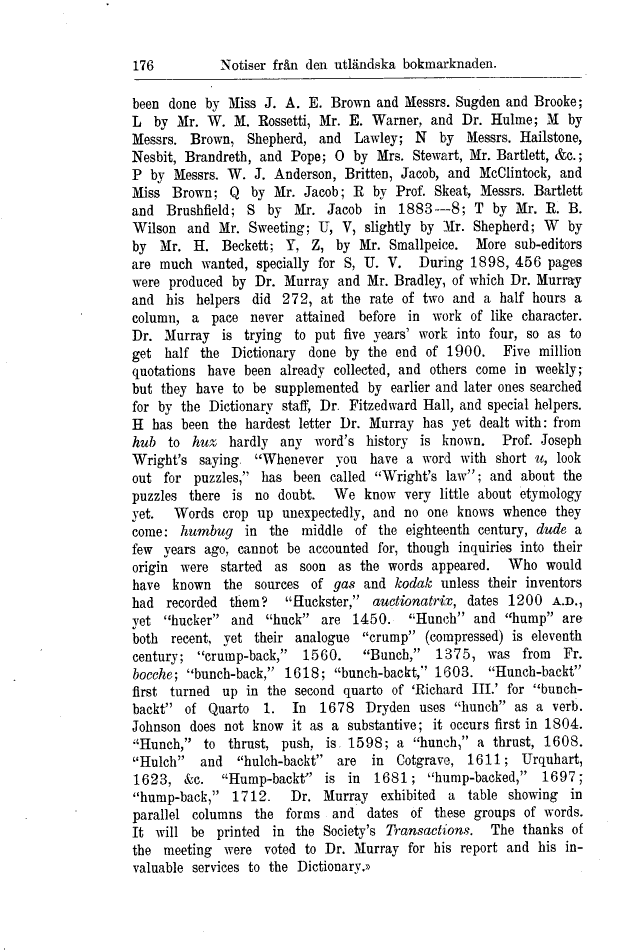
Full resolution (TIFF) - On this page / på denna sida - Sidor ...

<< prev. page << föreg. sida << >> nästa sida >> next page >>
Below is the raw OCR text
from the above scanned image.
Do you see an error? Proofread the page now!
Här nedan syns maskintolkade texten från faksimilbilden ovan.
Ser du något fel? Korrekturläs sidan nu!
This page has never been proofread. / Denna sida har aldrig korrekturlästs.
176
Notiser från den utländska bokmarknaden. 176
been done by Miss J. A. E. Brown and Messrs. Sugden and Brooke;
L by Mr. W. M. Eossetti, Mr. E. Warner, and Dr. Hulme; M by
Messrs. Brown, Shepherd, and Lawley; N by Messrs. Hailstone,
Nesbit, Brandreth, and Pope; O by Mrs. Stewart, Mr. Bartlett, &c. ;
P by Messrs. W. J. Anderson, Britten, Jacob, and McClintock, and
Miss Brown; Q by Mr. Jacob; E by Prof. Skeat, Messrs. Bartlett
and Brushfield; S by Mr. Jacob in 1883—8; T by Mr. E. B.
Wilson and Mr. Sweeting; U, V, slightly by Mr. Shepherd; W by
by Mr. H. Beckett; Y, Z, by Mr. Smallpeice. More sub-editors
are much wanted, specially for S, U. V. During 1898, 456 pages
were produced by Dr. Murray and Mr. Bradley, of which Dr. Murray
and his helpers did 272, at the rate of two and a half hours a
column, a pace never attained before in work of like character.
Dr. Murray is trying to put five years1 work into four, so as to
get half the Dictionary done by the end of 1900. Five million
quotations have been already collected, and others come in weekly;
but they have to be supplemented by earlier and later ones searched
for by the Dictionary staff, Dr. Fitzedward Hall, and special helpers.
H has been the hardest letter Dr. Murray has yet dealt with: from
hub to hu% hardly any word’s history is known. Prof. Joseph
Wright’s saying. "Whenever you have a word with short u, look
out for puzzles," has been called "Wright’s law"; and about the
puzzles there is no doubt. We know very little about etymology
yet. Words crop up unexpectedly, and no one knows whence they
come: humbug in the middle of the eighteenth century, dude a
few years ago, cannot be accounted for, though inquiries into their
origin were started as soon as the words appeared. Who would
have known the sources of gas and kodak unless their inventors
had recorded them? "Huckster," auctionatrix, dates 1200 A.D.,
yet "hucker" and "huck" are 1450. "Hunch" and "hump" are
both recent, vet their analogue "crump" (compressed) is eleventh
century; ’’crump-back," 1560. "Bunch," 1375, was from Fr.
bocche; ’’bunch-back," 1618; "bunch-backt," 1603. "Hunch-backt"
first turned up in the second quarto of ’Eichard III.’ for
"bunch-backt" of Quarto 1. In 1678 Dryden uses "hunch" as a verb.
Johnson does not know it as a substantive; it occurs first in 1804.
"Hunch," to thrust, push, is^ 1598; a "hunch," a thrust, 1608.
"Hulch" and "hulch-backt" are in Cotgrave, 1611; Urquhart,
1623, &c. "Hump-backt" is in 1681; "hump-backed," 1697;
"hump-back," 1712. Dr. Murray exhibited a table showing in
parallel columns the forms and dates of these groups of words.
It will be printed in the Society’s Transactions. The thanks of
the meeting were voted to Dr. Murray for his report and his
invaluable services to the Dictionary.»
<< prev. page << föreg. sida << >> nästa sida >> next page >>